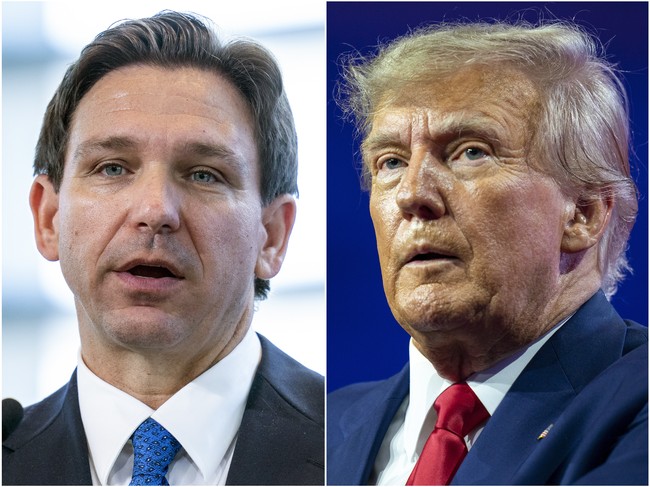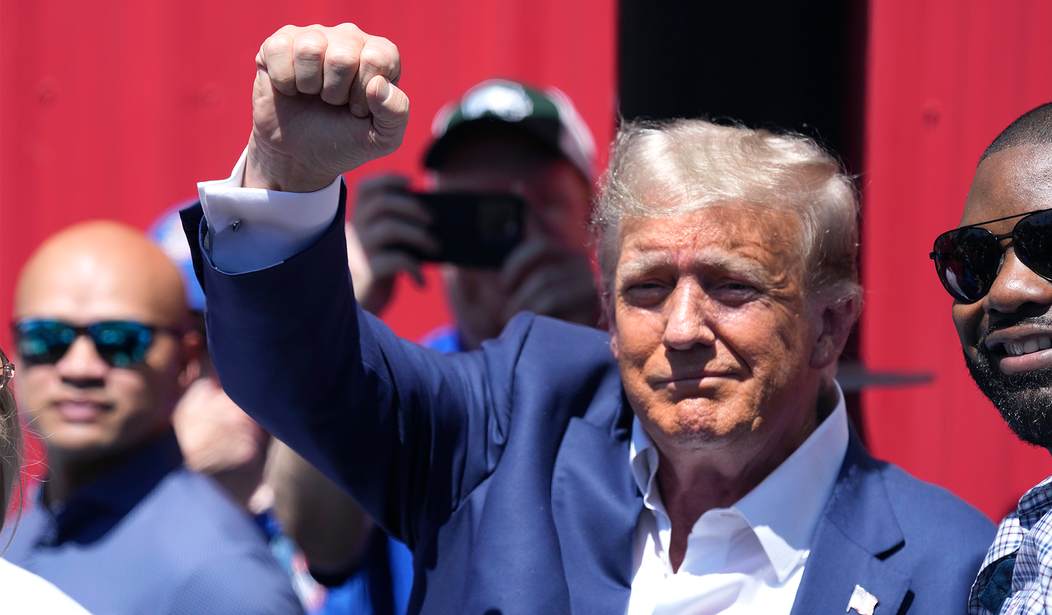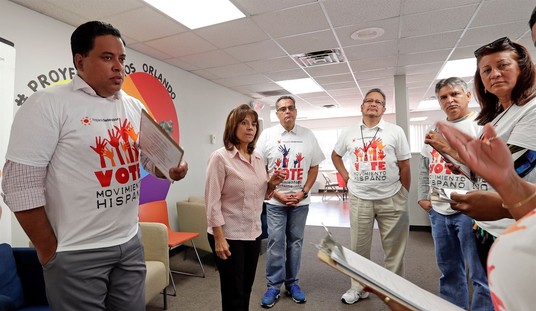Former President Donald Trump has maintained a fairly sizable lead over his opponents in national polling. Yesterday, he boasted a major lead in a CBS/YouGov poll that had him with over 60 percent of the national primary vote. He and his campaign have touted these numbers as part of the reason that he doesn't need to appear on a debate stage with his opponents this week.
That CBS/YouGov poll, however, is an outlier compared to the rest of the national polling. That poll has Trump sitting at 62 percent as opposed to other recent polls that have him sitting in the mid-50s for the most part. Still, it's a number he will proudly hold up and wave in the face of his opponents.
The problem for Trump, though, is that it's the state-level polling that matters, and the state-level polling doesn't show him that high. What it does show is that he's got a good lead, but it's not a lead that guarantees him victory. Take this morning's recent polling from NBC News/Des Moines Register/Mediacom.
IOWA 2024 POLL: @DMRegister
— InteractivePolls (@IAPolls2022) August 21, 2023
Trump 42% (+23)
DeSantis 19%
Scott 9%
Haley 6%
Pence 6%
Christie 5%
Ramaswamy 4%
Burgum 2%
Hurd 1%@jaselzer (A+) | 406 LV | 08/13-17https://t.co/mAw87OGJhN pic.twitter.com/GoIwH6ZzVd
Trump is sitting 23 percent higher than Ron DeSantis, but nowhere near that mid-50s number he's seeing nationally. And, as Iowa is the first state in the nation to hold a primary, that number is way more important.
The good news for Trump is the solid lead.
In the poll, 42% of likely Republican caucusgoers say Trump is their first choice out of 14 different GOP presidential candidates, while 19% pick DeSantis, the governor of Florida.
They’re followed by Scott, at 9%; former United Nations Ambassador Nikki Haley and former Vice President Mike Pence, both at 6%; former New Jersey Gov. Chris Christie at 5%; and entrepreneur Vivek Ramaswamy at 4%.
However, some of the other numbers suggest he is not invulnerable.
Trump leads DeSantis among self-identified Republican caucusgoers (51% to 20%), among first-time caucugsoers (47% to 18%) and among evangelical Christians (47% to 20%).
But the two men are essentially tied among likely Republican caucusgoers who identify as independents (with Trump at 21% and DeSantis at 19%).
DeSantis is the top second-choice candidate in the poll, with 20% of likely Iowa caucusgoers choosing him as their no. 2 pick, followed by Scott (the second choice of 15%) and Ramaswamy (who was the second choice of 12%).
Additional portions of GOP caucusgoers say they’re actively considering Scott (29%), Haley (29%) and DeSantis (22%).

And while there is talk about how Trump's indictments may be playing a role in the primary, the fact is that Trump's lead over the rest of the field may be higher, but his percentages remain relatively flat in Iowa. If you look at all recent polling in Iowa (as seen at RealClearPolitics, for example), Trump's numbers have been consistently in the lower 40s. What's noteworthy is that DeSantis has been slowly on the rise there, but that's not a talking point you see breaking through the noise.
But DeSantis and the other candidates still have a problem. Yes, Trump has the lead, but just over half of those polled say their minds aren't made up yet.
Importantly, a majority of Republican caucusgoers in Iowa — 52% — say their minds aren’t made up, and they could be persuaded to support another candidate.
That compares with 40% who say their minds are made up.
“The caucus is designed for people to keep an open mind,” said Selzer, the Iowa pollster.
Two-thirds of Trump's voters say their minds are made up, meaning that, right now, about 14 percent are persuadable. That can make a difference, especially since the caucuses are still so far out. The challengers' first attempt to persuade those voters comes Wednesday night when they take the debate stage.
They will be navigating a minefield, though, trying to avoid getting trapped by questions about Trump and his indictments while also trying to avoid getting trapped by the other opponents. One would hope that the specter of Trump doesn't linger on the stage and distract from the chance to make a name for themselves and represent their own positions.
On that stage, the Republican candidates who aren't Trump will have the chance to explain why they, not the former president, are the best choice for the party in 2024. Trump won't be there, which does give them room to breathe, but it also means they will be turning on each other more, and that can shift the field, as well.
Trump, for his part, seems confident that his numbers will hold. And while that may happen, he's taking a big gamble: Any of those candidates can have a big moment on that stage that helps propel them forward and gives them a chance to become a bigger threat to him, and he won't be there to cut them off at the knees. That's quite the risk for someone who owes part of his rise in 2016 to his ability to get people down into squabbles and come out on top. He can't do that when he's not there.













Join the conversation as a VIP Member